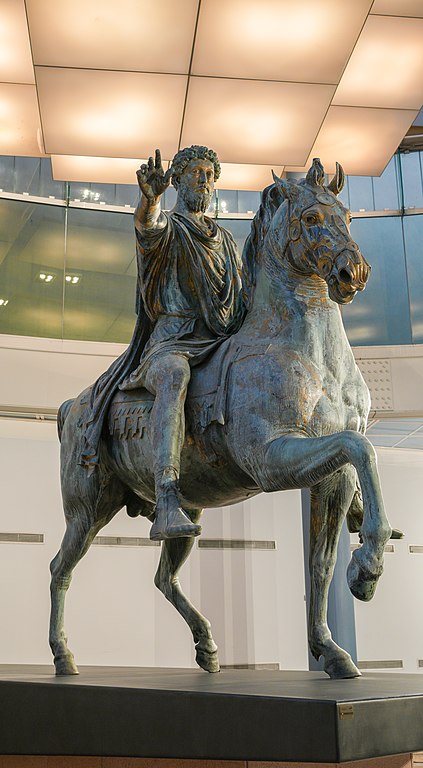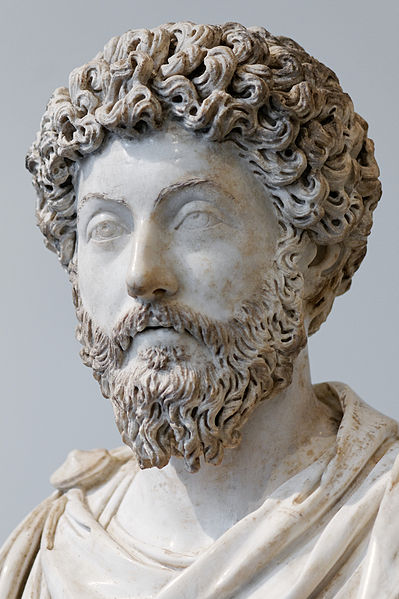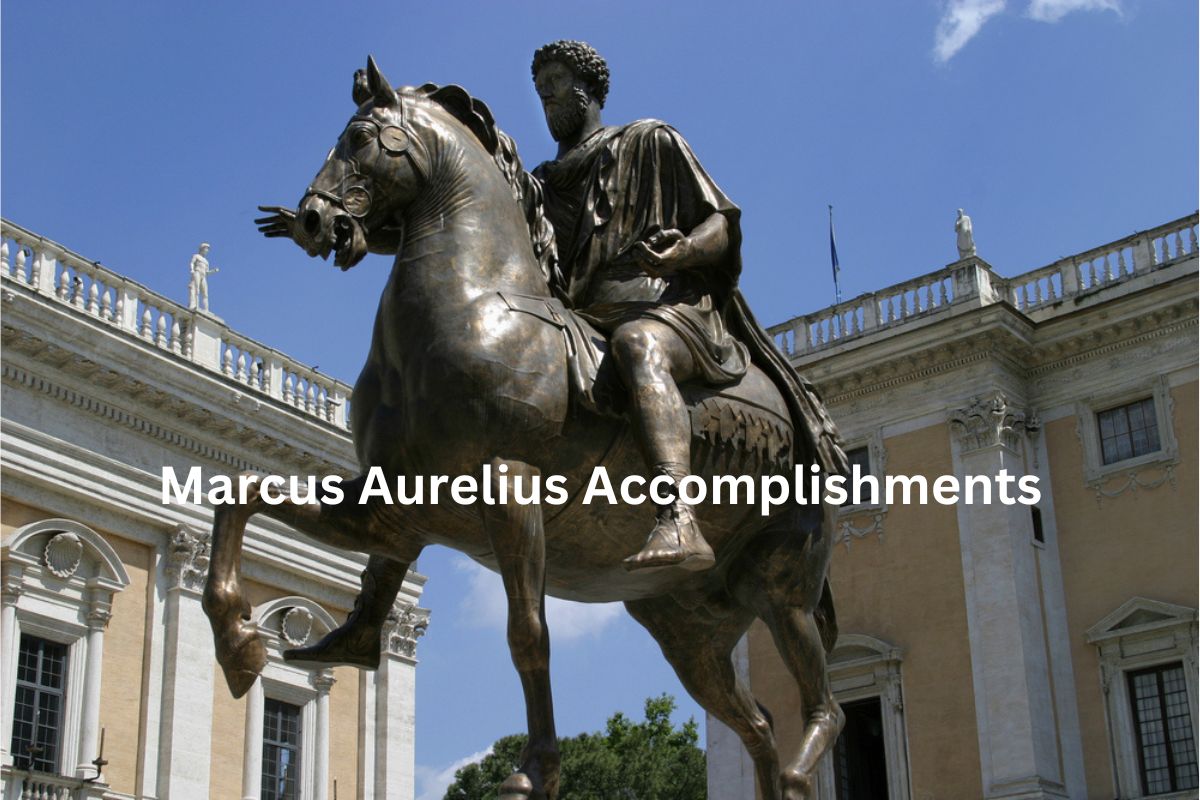Marcus Aurelius (121-180 AD) was a Roman emperor who ruled from 161 to 180 AD. Born into a wealthy and influential family, he received an excellent education in philosophy and literature.
Aurelius is best known for his personal writings, known as “Meditations,” which have had a lasting impact on philosophy and self-improvement. As emperor, he faced numerous challenges, including military conflicts with Germanic tribes and the need to maintain stability within the Roman Empire.
Despite these pressures, Aurelius was known for his moral integrity, stoic principles, and commitment to justice. He enacted legal reforms, promoted education, and initiated public works projects to improve the lives of Roman citizens.
Aurelius passed away in 180 AD, leaving behind a legacy as a wise and respected philosopher-emperor.
Accomplishments of Marcus Aurelius
1. Wrote the influential philosophical work “Meditations”
Marcus Aurelius is renowned for his personal writings, collectively known as “Meditations” or “The Meditations of Marcus Aurelius.” In this work, he documented his reflections on life, virtue, morality, and the pursuit of wisdom.
Also Read: Facts About Marcus Aurelius
These meditations served as a guide for his own personal growth and self-improvement. Written in a concise and practical style, “Meditations” offers timeless insights and has become a cornerstone of Stoic philosophy.
Its enduring popularity lies in its ability to provide guidance on how to live a virtuous and fulfilling life.

2. Led successful military campaigns against Germanic tribes
During his reign, Marcus Aurelius faced numerous military challenges, particularly from Germanic tribes along the northern borders of the Roman Empire.
The Marcomanni, Quadi, and Jazyges posed significant threats, launching invasions and raids into Roman territory. Aurelius took a hands-on approach, personally leading his armies in several successful campaigns against these tribes.
He displayed military prowess, resilience, and strategic acumen, effectively repelling the invaders and restoring stability to the frontier regions of the empire.
3. Implemented legal reforms to protect individual rights and prevent corruption
Recognizing the importance of a fair and just legal system, Marcus Aurelius enacted various reforms aimed at protecting the rights of individuals and curbing corruption. He sought to promote equity and ensure that justice was administered impartially.
Aurelius introduced measures to safeguard the rights of slaves and prisoners, prohibiting cruel and inhumane treatment. He also took steps to address corruption within the legal system by implementing stricter guidelines for judges and encouraging transparency in judicial proceedings.
These reforms aimed to strengthen the rule of law and ensure the fair treatment of all citizens under Roman jurisdiction.
4. Initiated civic and infrastructure projects throughout the empire
Marcus Aurelius recognized the importance of improving the living conditions of Roman citizens and enhancing the infrastructure of the empire. To achieve this, he initiated numerous civic and infrastructure projects.
He commissioned the construction and restoration of buildings, including temples, public baths, and administrative structures, in various cities across the empire. Additionally, Aurelius invested in the expansion and maintenance of aqueducts, ensuring a steady supply of water to urban areas.
He also prioritized the improvement of roads and transportation networks, facilitating trade and communication throughout the vast Roman Empire.

5. Promoted education and founded schools
Aurelius placed great emphasis on education and believed in the transformative power of knowledge. He actively promoted the pursuit of intellectual and moral development among Roman citizens.
Recognizing the importance of quality education, he established schools and supported the training of teachers. These educational institutions provided a wide range of subjects, including philosophy, literature, mathematics, and rhetoric.
By fostering a culture of learning, Aurelius aimed to equip future generations with the skills and knowledge necessary for personal growth, civic engagement, and leadership.
6. Supported charitable activities and welfare programs
Marcus Aurelius demonstrated a genuine concern for the well-being of the less fortunate members of Roman society. He actively supported charitable activities and welfare programs aimed at assisting those in need.
Aurelius provided financial aid and established institutions to support orphans, the poor, and individuals facing hardship. These programs aimed to alleviate suffering, provide essential resources, and empower individuals to overcome their challenges.
Aurelius’ commitment to charity and welfare reflected his belief in the importance of compassion and the duty of the state to care for its most vulnerable members.
7. Demonstrated religious tolerance towards different beliefs
Marcus Aurelius was known for his relatively tolerant attitude towards various religious beliefs during his reign. Despite occasional persecutions of Christians by local authorities in some regions, Aurelius himself did not actively seek to suppress or discriminate against different religious groups.
He respected the customs, traditions, and religious practices of diverse communities within the Roman Empire. This approach to religious tolerance helped foster a sense of inclusivity and allowed for the coexistence of different faiths during his rule.
8. Maintained diplomatic relations with foreign powers, including Parthia
Aurelius recognized the importance of maintaining peaceful relations with foreign powers to ensure the stability and security of the Roman Empire. He actively engaged in diplomacy, particularly with Parthia, the eastern rival of the Roman Empire.
Through negotiations and strategic alliances, Aurelius aimed to prevent unnecessary conflicts and maintain a balance of power in the region. His diplomatic efforts helped preserve peace and stability, thus benefiting the empire and its subjects.
9. Collaborated with the Senate and respected its authority
In contrast to some emperors who sought to consolidate power solely in their own hands, Marcus Aurelius worked closely with the Senate and respected its authority. He recognized the importance of the Senate as an integral institution in the governance of the Roman Empire.
Aurelius sought the input and advice of senators, allowing them to actively participate in decision-making processes. This collaborative approach helped maintain a sense of shared responsibility and legitimacy in the administration of the empire.
10. Exemplified stoic principles in personal life and leadership
Marcus Aurelius was deeply influenced by stoic philosophy and strove to embody its principles in his personal life and leadership.
Stoicism emphasizes self-discipline, resilience, and the pursuit of virtue. Aurelius exemplified these values through his disciplined lifestyle, personal integrity, and commitment to duty. He faced the challenges of ruling an empire with stoic calmness, displaying emotional resilience in the face of adversity.
Aurelius’ adherence to stoic principles earned him respect as a wise and virtuous leader, and his writings in “Meditations” continue to inspire individuals seeking personal growth and self-improvement.
